Contract Law: Enforceability of Contract Variations with Case Law
VerifiedAdded on 2023/06/10
|14
|4772
|384
Essay
AI Summary
This essay delves into the legal arguments surrounding the enforceability of contract variations, particularly in commercial contexts. It examines the importance of variation clauses, the requirements for valid agreements under common law, and the concept of consideration. The analysis draws heavily on the landmark case of Williams v Roffey Bros & Nicholls (Contractors) Ltd, exploring arguments related to the first agreement, variations of terms, duress, and practical benefit. The essay also addresses the rights of third parties under the Contract (Rights of Third Parties) Act 1999 and how these rights interact with contract variations. Furthermore, it discusses the consistency of legal authorities in the Williams v Roffey case, emphasizing the practical benefits and obligations of the involved parties and conditions for valid variations.
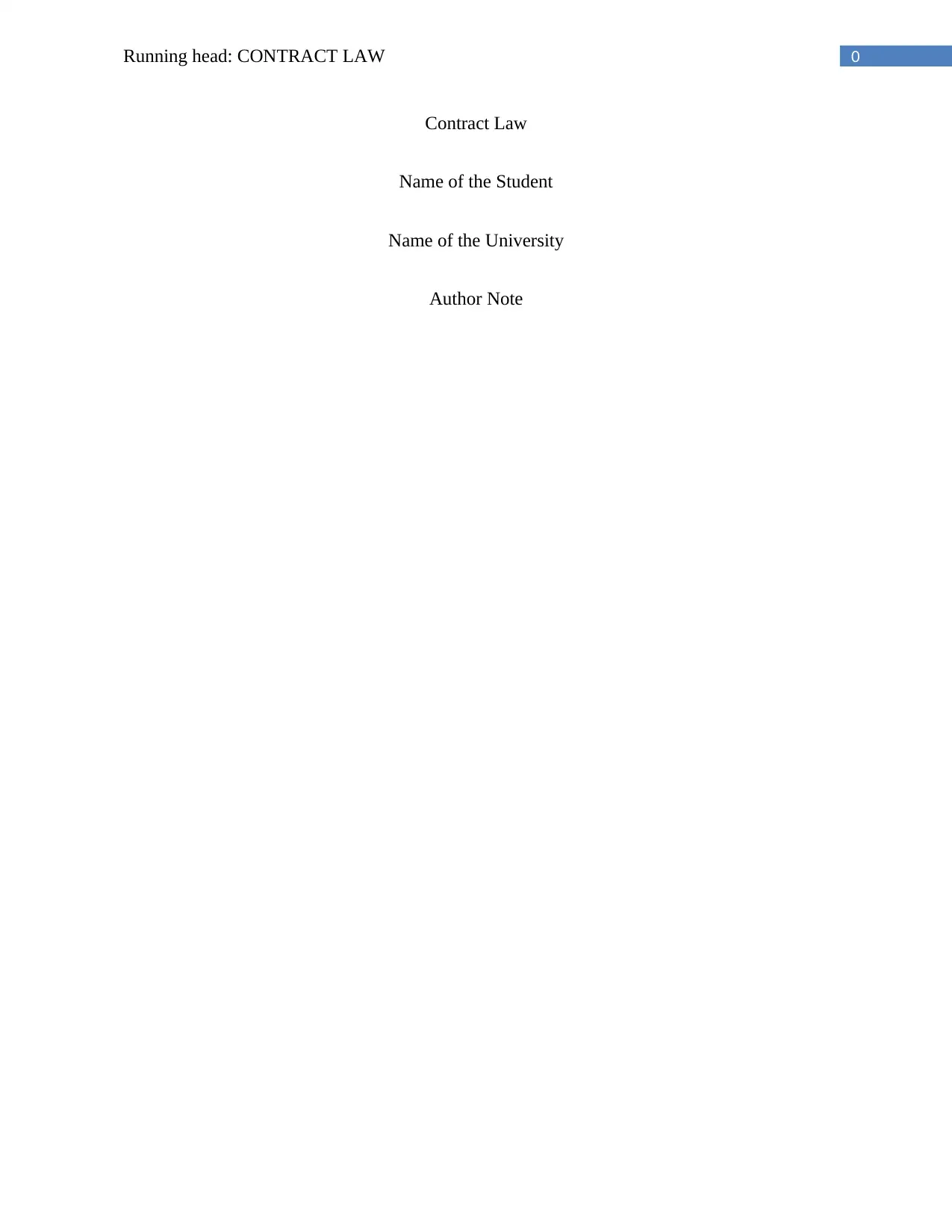
0Running head: CONTRACT LAW
Contract Law
Name of the Student
Name of the University
Author Note
Contract Law
Name of the Student
Name of the University
Author Note
Paraphrase This Document
Need a fresh take? Get an instant paraphrase of this document with our AI Paraphraser
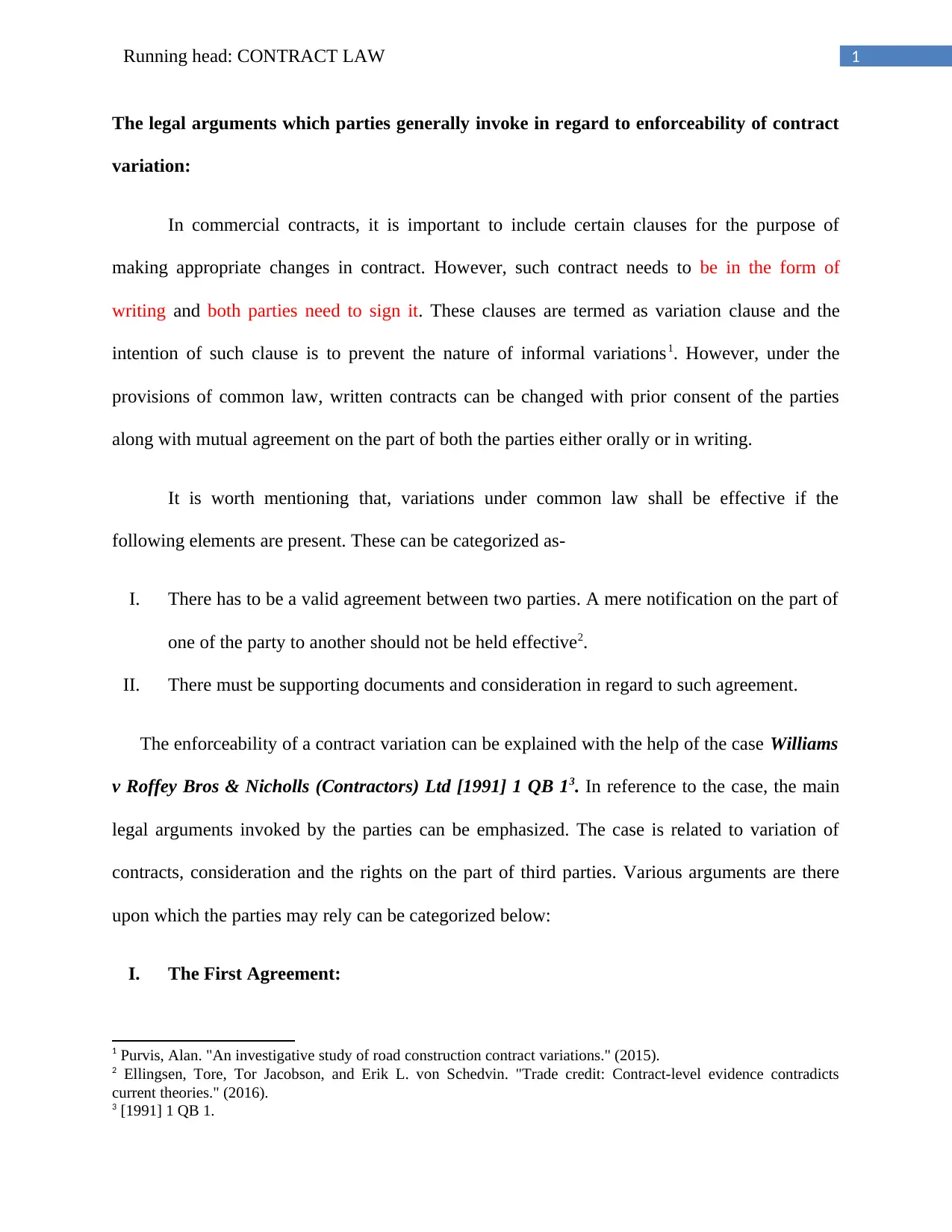
1Running head: CONTRACT LAW
The legal arguments which parties generally invoke in regard to enforceability of contract
variation:
In commercial contracts, it is important to include certain clauses for the purpose of
making appropriate changes in contract. However, such contract needs to be in the form of
writing and both parties need to sign it. These clauses are termed as variation clause and the
intention of such clause is to prevent the nature of informal variations1. However, under the
provisions of common law, written contracts can be changed with prior consent of the parties
along with mutual agreement on the part of both the parties either orally or in writing.
It is worth mentioning that, variations under common law shall be effective if the
following elements are present. These can be categorized as-
I. There has to be a valid agreement between two parties. A mere notification on the part of
one of the party to another should not be held effective2.
II. There must be supporting documents and consideration in regard to such agreement.
The enforceability of a contract variation can be explained with the help of the case Williams
v Roffey Bros & Nicholls (Contractors) Ltd [1991] 1 QB 13. In reference to the case, the main
legal arguments invoked by the parties can be emphasized. The case is related to variation of
contracts, consideration and the rights on the part of third parties. Various arguments are there
upon which the parties may rely can be categorized below:
I. The First Agreement:
1 Purvis, Alan. "An investigative study of road construction contract variations." (2015).
2 Ellingsen, Tore, Tor Jacobson, and Erik L. von Schedvin. "Trade credit: Contract-level evidence contradicts
current theories." (2016).
3 [1991] 1 QB 1.
The legal arguments which parties generally invoke in regard to enforceability of contract
variation:
In commercial contracts, it is important to include certain clauses for the purpose of
making appropriate changes in contract. However, such contract needs to be in the form of
writing and both parties need to sign it. These clauses are termed as variation clause and the
intention of such clause is to prevent the nature of informal variations1. However, under the
provisions of common law, written contracts can be changed with prior consent of the parties
along with mutual agreement on the part of both the parties either orally or in writing.
It is worth mentioning that, variations under common law shall be effective if the
following elements are present. These can be categorized as-
I. There has to be a valid agreement between two parties. A mere notification on the part of
one of the party to another should not be held effective2.
II. There must be supporting documents and consideration in regard to such agreement.
The enforceability of a contract variation can be explained with the help of the case Williams
v Roffey Bros & Nicholls (Contractors) Ltd [1991] 1 QB 13. In reference to the case, the main
legal arguments invoked by the parties can be emphasized. The case is related to variation of
contracts, consideration and the rights on the part of third parties. Various arguments are there
upon which the parties may rely can be categorized below:
I. The First Agreement:
1 Purvis, Alan. "An investigative study of road construction contract variations." (2015).
2 Ellingsen, Tore, Tor Jacobson, and Erik L. von Schedvin. "Trade credit: Contract-level evidence contradicts
current theories." (2016).
3 [1991] 1 QB 1.
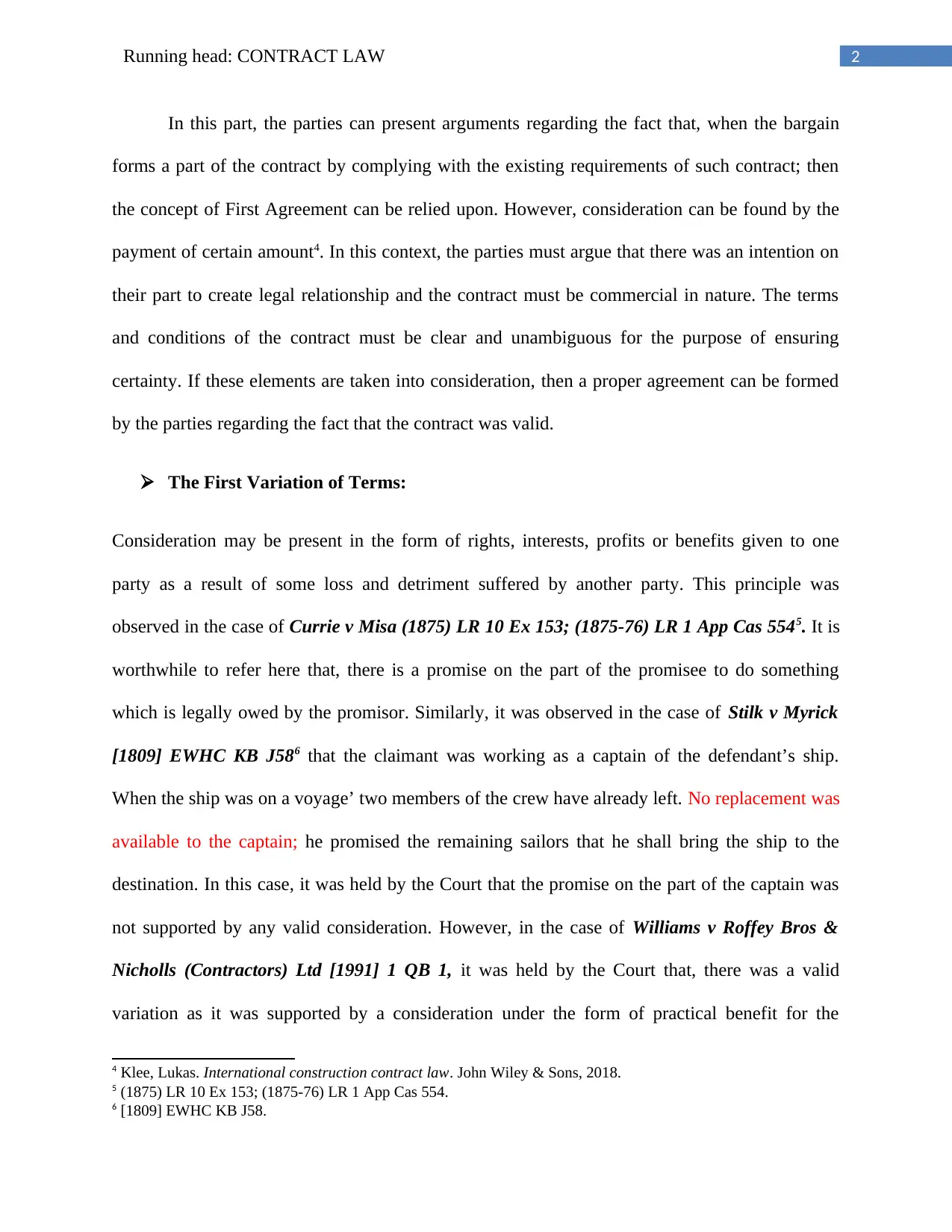
2Running head: CONTRACT LAW
In this part, the parties can present arguments regarding the fact that, when the bargain
forms a part of the contract by complying with the existing requirements of such contract; then
the concept of First Agreement can be relied upon. However, consideration can be found by the
payment of certain amount4. In this context, the parties must argue that there was an intention on
their part to create legal relationship and the contract must be commercial in nature. The terms
and conditions of the contract must be clear and unambiguous for the purpose of ensuring
certainty. If these elements are taken into consideration, then a proper agreement can be formed
by the parties regarding the fact that the contract was valid.
The First Variation of Terms:
Consideration may be present in the form of rights, interests, profits or benefits given to one
party as a result of some loss and detriment suffered by another party. This principle was
observed in the case of Currie v Misa (1875) LR 10 Ex 153; (1875-76) LR 1 App Cas 5545. It is
worthwhile to refer here that, there is a promise on the part of the promisee to do something
which is legally owed by the promisor. Similarly, it was observed in the case of Stilk v Myrick
[1809] EWHC KB J586 that the claimant was working as a captain of the defendant’s ship.
When the ship was on a voyage’ two members of the crew have already left. No replacement was
available to the captain; he promised the remaining sailors that he shall bring the ship to the
destination. In this case, it was held by the Court that the promise on the part of the captain was
not supported by any valid consideration. However, in the case of Williams v Roffey Bros &
Nicholls (Contractors) Ltd [1991] 1 QB 1, it was held by the Court that, there was a valid
variation as it was supported by a consideration under the form of practical benefit for the
4 Klee, Lukas. International construction contract law. John Wiley & Sons, 2018.
5 (1875) LR 10 Ex 153; (1875-76) LR 1 App Cas 554.
6 [1809] EWHC KB J58.
In this part, the parties can present arguments regarding the fact that, when the bargain
forms a part of the contract by complying with the existing requirements of such contract; then
the concept of First Agreement can be relied upon. However, consideration can be found by the
payment of certain amount4. In this context, the parties must argue that there was an intention on
their part to create legal relationship and the contract must be commercial in nature. The terms
and conditions of the contract must be clear and unambiguous for the purpose of ensuring
certainty. If these elements are taken into consideration, then a proper agreement can be formed
by the parties regarding the fact that the contract was valid.
The First Variation of Terms:
Consideration may be present in the form of rights, interests, profits or benefits given to one
party as a result of some loss and detriment suffered by another party. This principle was
observed in the case of Currie v Misa (1875) LR 10 Ex 153; (1875-76) LR 1 App Cas 5545. It is
worthwhile to refer here that, there is a promise on the part of the promisee to do something
which is legally owed by the promisor. Similarly, it was observed in the case of Stilk v Myrick
[1809] EWHC KB J586 that the claimant was working as a captain of the defendant’s ship.
When the ship was on a voyage’ two members of the crew have already left. No replacement was
available to the captain; he promised the remaining sailors that he shall bring the ship to the
destination. In this case, it was held by the Court that the promise on the part of the captain was
not supported by any valid consideration. However, in the case of Williams v Roffey Bros &
Nicholls (Contractors) Ltd [1991] 1 QB 1, it was held by the Court that, there was a valid
variation as it was supported by a consideration under the form of practical benefit for the
4 Klee, Lukas. International construction contract law. John Wiley & Sons, 2018.
5 (1875) LR 10 Ex 153; (1875-76) LR 1 App Cas 554.
6 [1809] EWHC KB J58.
⊘ This is a preview!⊘
Do you want full access?
Subscribe today to unlock all pages.

Trusted by 1+ million students worldwide
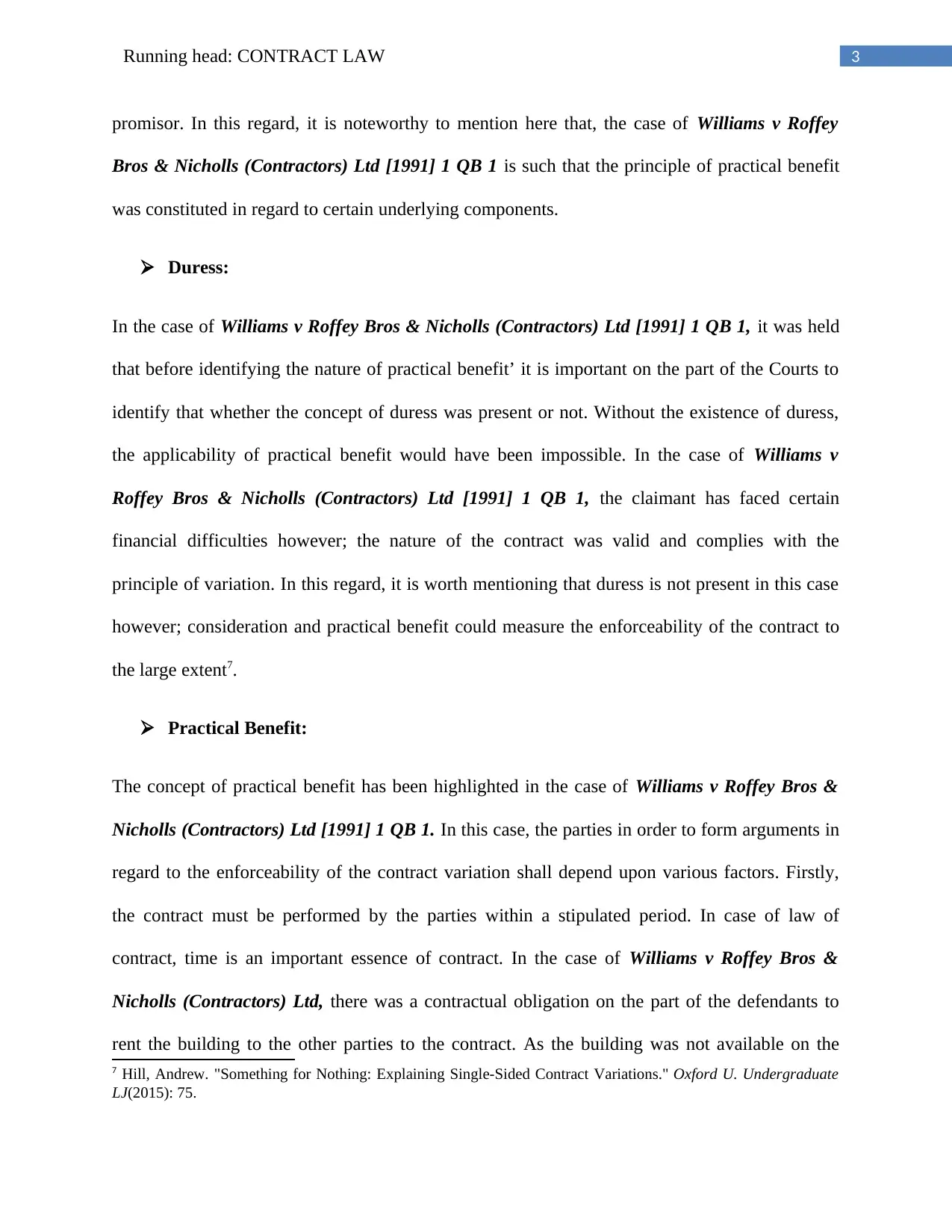
3Running head: CONTRACT LAW
promisor. In this regard, it is noteworthy to mention here that, the case of Williams v Roffey
Bros & Nicholls (Contractors) Ltd [1991] 1 QB 1 is such that the principle of practical benefit
was constituted in regard to certain underlying components.
Duress:
In the case of Williams v Roffey Bros & Nicholls (Contractors) Ltd [1991] 1 QB 1, it was held
that before identifying the nature of practical benefit’ it is important on the part of the Courts to
identify that whether the concept of duress was present or not. Without the existence of duress,
the applicability of practical benefit would have been impossible. In the case of Williams v
Roffey Bros & Nicholls (Contractors) Ltd [1991] 1 QB 1, the claimant has faced certain
financial difficulties however; the nature of the contract was valid and complies with the
principle of variation. In this regard, it is worth mentioning that duress is not present in this case
however; consideration and practical benefit could measure the enforceability of the contract to
the large extent7.
Practical Benefit:
The concept of practical benefit has been highlighted in the case of Williams v Roffey Bros &
Nicholls (Contractors) Ltd [1991] 1 QB 1. In this case, the parties in order to form arguments in
regard to the enforceability of the contract variation shall depend upon various factors. Firstly,
the contract must be performed by the parties within a stipulated period. In case of law of
contract, time is an important essence of contract. In the case of Williams v Roffey Bros &
Nicholls (Contractors) Ltd, there was a contractual obligation on the part of the defendants to
rent the building to the other parties to the contract. As the building was not available on the
7 Hill, Andrew. "Something for Nothing: Explaining Single-Sided Contract Variations." Oxford U. Undergraduate
LJ(2015): 75.
promisor. In this regard, it is noteworthy to mention here that, the case of Williams v Roffey
Bros & Nicholls (Contractors) Ltd [1991] 1 QB 1 is such that the principle of practical benefit
was constituted in regard to certain underlying components.
Duress:
In the case of Williams v Roffey Bros & Nicholls (Contractors) Ltd [1991] 1 QB 1, it was held
that before identifying the nature of practical benefit’ it is important on the part of the Courts to
identify that whether the concept of duress was present or not. Without the existence of duress,
the applicability of practical benefit would have been impossible. In the case of Williams v
Roffey Bros & Nicholls (Contractors) Ltd [1991] 1 QB 1, the claimant has faced certain
financial difficulties however; the nature of the contract was valid and complies with the
principle of variation. In this regard, it is worth mentioning that duress is not present in this case
however; consideration and practical benefit could measure the enforceability of the contract to
the large extent7.
Practical Benefit:
The concept of practical benefit has been highlighted in the case of Williams v Roffey Bros &
Nicholls (Contractors) Ltd [1991] 1 QB 1. In this case, the parties in order to form arguments in
regard to the enforceability of the contract variation shall depend upon various factors. Firstly,
the contract must be performed by the parties within a stipulated period. In case of law of
contract, time is an important essence of contract. In the case of Williams v Roffey Bros &
Nicholls (Contractors) Ltd, there was a contractual obligation on the part of the defendants to
rent the building to the other parties to the contract. As the building was not available on the
7 Hill, Andrew. "Something for Nothing: Explaining Single-Sided Contract Variations." Oxford U. Undergraduate
LJ(2015): 75.
Paraphrase This Document
Need a fresh take? Get an instant paraphrase of this document with our AI Paraphraser
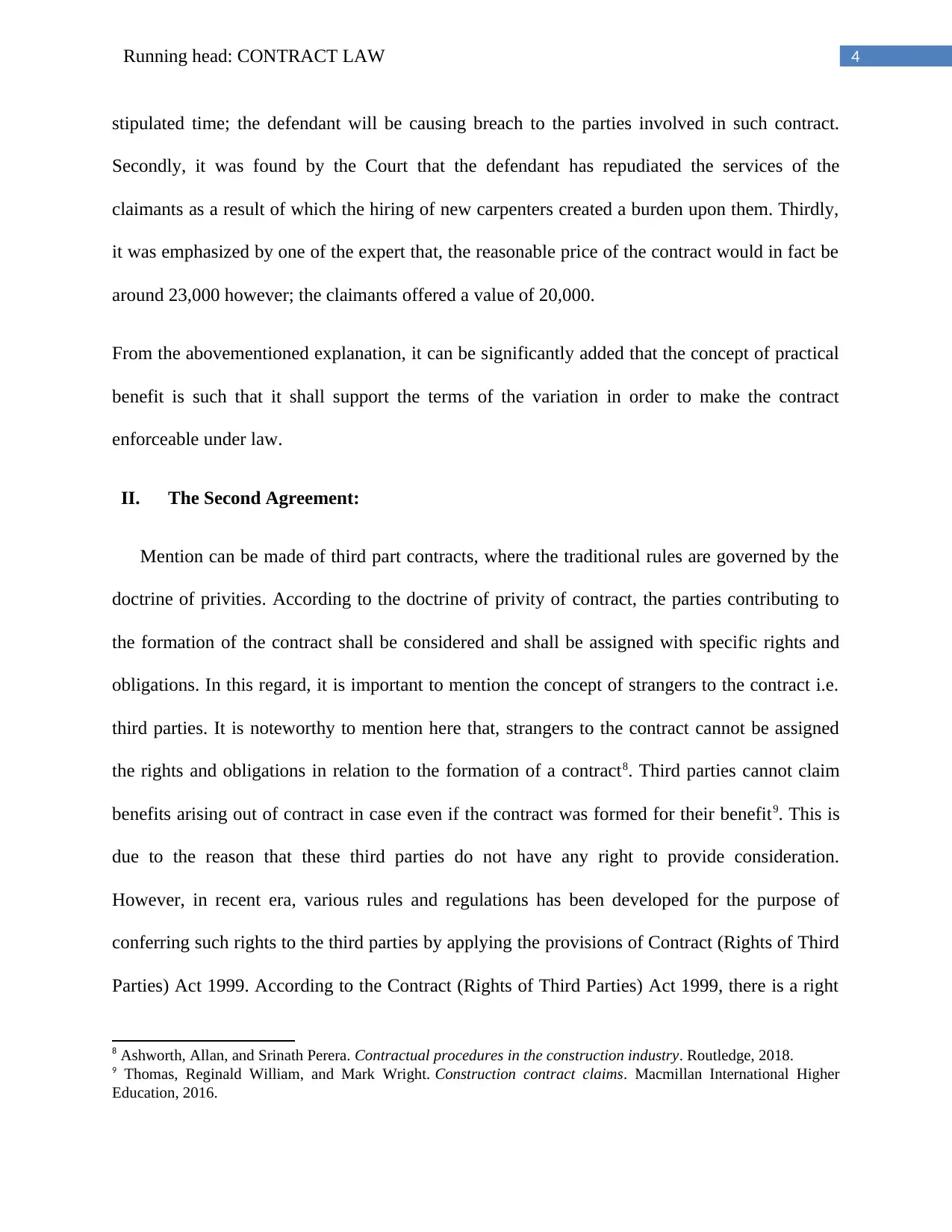
4Running head: CONTRACT LAW
stipulated time; the defendant will be causing breach to the parties involved in such contract.
Secondly, it was found by the Court that the defendant has repudiated the services of the
claimants as a result of which the hiring of new carpenters created a burden upon them. Thirdly,
it was emphasized by one of the expert that, the reasonable price of the contract would in fact be
around 23,000 however; the claimants offered a value of 20,000.
From the abovementioned explanation, it can be significantly added that the concept of practical
benefit is such that it shall support the terms of the variation in order to make the contract
enforceable under law.
II. The Second Agreement:
Mention can be made of third part contracts, where the traditional rules are governed by the
doctrine of privities. According to the doctrine of privity of contract, the parties contributing to
the formation of the contract shall be considered and shall be assigned with specific rights and
obligations. In this regard, it is important to mention the concept of strangers to the contract i.e.
third parties. It is noteworthy to mention here that, strangers to the contract cannot be assigned
the rights and obligations in relation to the formation of a contract8. Third parties cannot claim
benefits arising out of contract in case even if the contract was formed for their benefit9. This is
due to the reason that these third parties do not have any right to provide consideration.
However, in recent era, various rules and regulations has been developed for the purpose of
conferring such rights to the third parties by applying the provisions of Contract (Rights of Third
Parties) Act 1999. According to the Contract (Rights of Third Parties) Act 1999, there is a right
8 Ashworth, Allan, and Srinath Perera. Contractual procedures in the construction industry. Routledge, 2018.
9 Thomas, Reginald William, and Mark Wright. Construction contract claims. Macmillan International Higher
Education, 2016.
stipulated time; the defendant will be causing breach to the parties involved in such contract.
Secondly, it was found by the Court that the defendant has repudiated the services of the
claimants as a result of which the hiring of new carpenters created a burden upon them. Thirdly,
it was emphasized by one of the expert that, the reasonable price of the contract would in fact be
around 23,000 however; the claimants offered a value of 20,000.
From the abovementioned explanation, it can be significantly added that the concept of practical
benefit is such that it shall support the terms of the variation in order to make the contract
enforceable under law.
II. The Second Agreement:
Mention can be made of third part contracts, where the traditional rules are governed by the
doctrine of privities. According to the doctrine of privity of contract, the parties contributing to
the formation of the contract shall be considered and shall be assigned with specific rights and
obligations. In this regard, it is important to mention the concept of strangers to the contract i.e.
third parties. It is noteworthy to mention here that, strangers to the contract cannot be assigned
the rights and obligations in relation to the formation of a contract8. Third parties cannot claim
benefits arising out of contract in case even if the contract was formed for their benefit9. This is
due to the reason that these third parties do not have any right to provide consideration.
However, in recent era, various rules and regulations has been developed for the purpose of
conferring such rights to the third parties by applying the provisions of Contract (Rights of Third
Parties) Act 1999. According to the Contract (Rights of Third Parties) Act 1999, there is a right
8 Ashworth, Allan, and Srinath Perera. Contractual procedures in the construction industry. Routledge, 2018.
9 Thomas, Reginald William, and Mark Wright. Construction contract claims. Macmillan International Higher
Education, 2016.
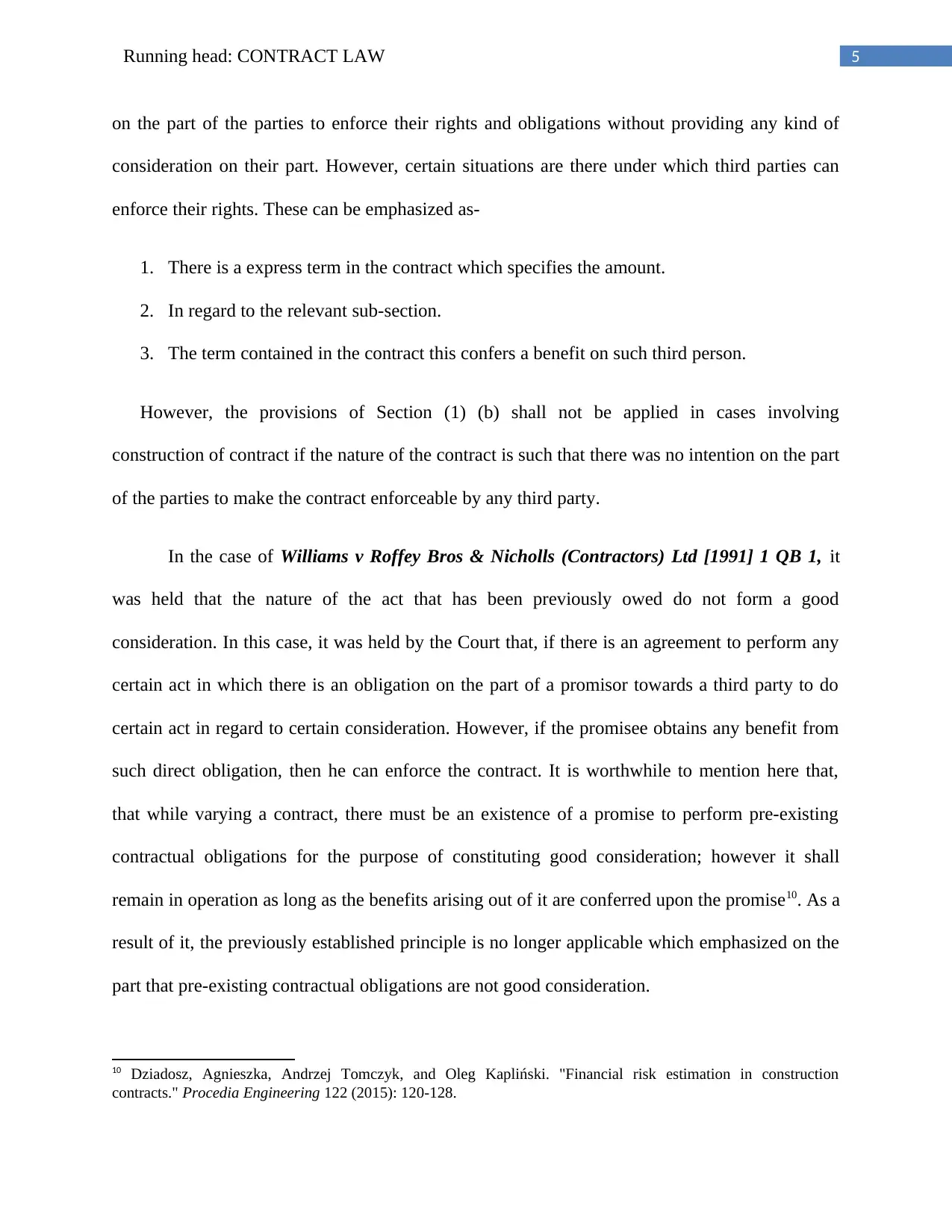
5Running head: CONTRACT LAW
on the part of the parties to enforce their rights and obligations without providing any kind of
consideration on their part. However, certain situations are there under which third parties can
enforce their rights. These can be emphasized as-
1. There is a express term in the contract which specifies the amount.
2. In regard to the relevant sub-section.
3. The term contained in the contract this confers a benefit on such third person.
However, the provisions of Section (1) (b) shall not be applied in cases involving
construction of contract if the nature of the contract is such that there was no intention on the part
of the parties to make the contract enforceable by any third party.
In the case of Williams v Roffey Bros & Nicholls (Contractors) Ltd [1991] 1 QB 1, it
was held that the nature of the act that has been previously owed do not form a good
consideration. In this case, it was held by the Court that, if there is an agreement to perform any
certain act in which there is an obligation on the part of a promisor towards a third party to do
certain act in regard to certain consideration. However, if the promisee obtains any benefit from
such direct obligation, then he can enforce the contract. It is worthwhile to mention here that,
that while varying a contract, there must be an existence of a promise to perform pre-existing
contractual obligations for the purpose of constituting good consideration; however it shall
remain in operation as long as the benefits arising out of it are conferred upon the promise10. As a
result of it, the previously established principle is no longer applicable which emphasized on the
part that pre-existing contractual obligations are not good consideration.
10 Dziadosz, Agnieszka, Andrzej Tomczyk, and Oleg Kapliński. "Financial risk estimation in construction
contracts." Procedia Engineering 122 (2015): 120-128.
on the part of the parties to enforce their rights and obligations without providing any kind of
consideration on their part. However, certain situations are there under which third parties can
enforce their rights. These can be emphasized as-
1. There is a express term in the contract which specifies the amount.
2. In regard to the relevant sub-section.
3. The term contained in the contract this confers a benefit on such third person.
However, the provisions of Section (1) (b) shall not be applied in cases involving
construction of contract if the nature of the contract is such that there was no intention on the part
of the parties to make the contract enforceable by any third party.
In the case of Williams v Roffey Bros & Nicholls (Contractors) Ltd [1991] 1 QB 1, it
was held that the nature of the act that has been previously owed do not form a good
consideration. In this case, it was held by the Court that, if there is an agreement to perform any
certain act in which there is an obligation on the part of a promisor towards a third party to do
certain act in regard to certain consideration. However, if the promisee obtains any benefit from
such direct obligation, then he can enforce the contract. It is worthwhile to mention here that,
that while varying a contract, there must be an existence of a promise to perform pre-existing
contractual obligations for the purpose of constituting good consideration; however it shall
remain in operation as long as the benefits arising out of it are conferred upon the promise10. As a
result of it, the previously established principle is no longer applicable which emphasized on the
part that pre-existing contractual obligations are not good consideration.
10 Dziadosz, Agnieszka, Andrzej Tomczyk, and Oleg Kapliński. "Financial risk estimation in construction
contracts." Procedia Engineering 122 (2015): 120-128.
⊘ This is a preview!⊘
Do you want full access?
Subscribe today to unlock all pages.

Trusted by 1+ million students worldwide
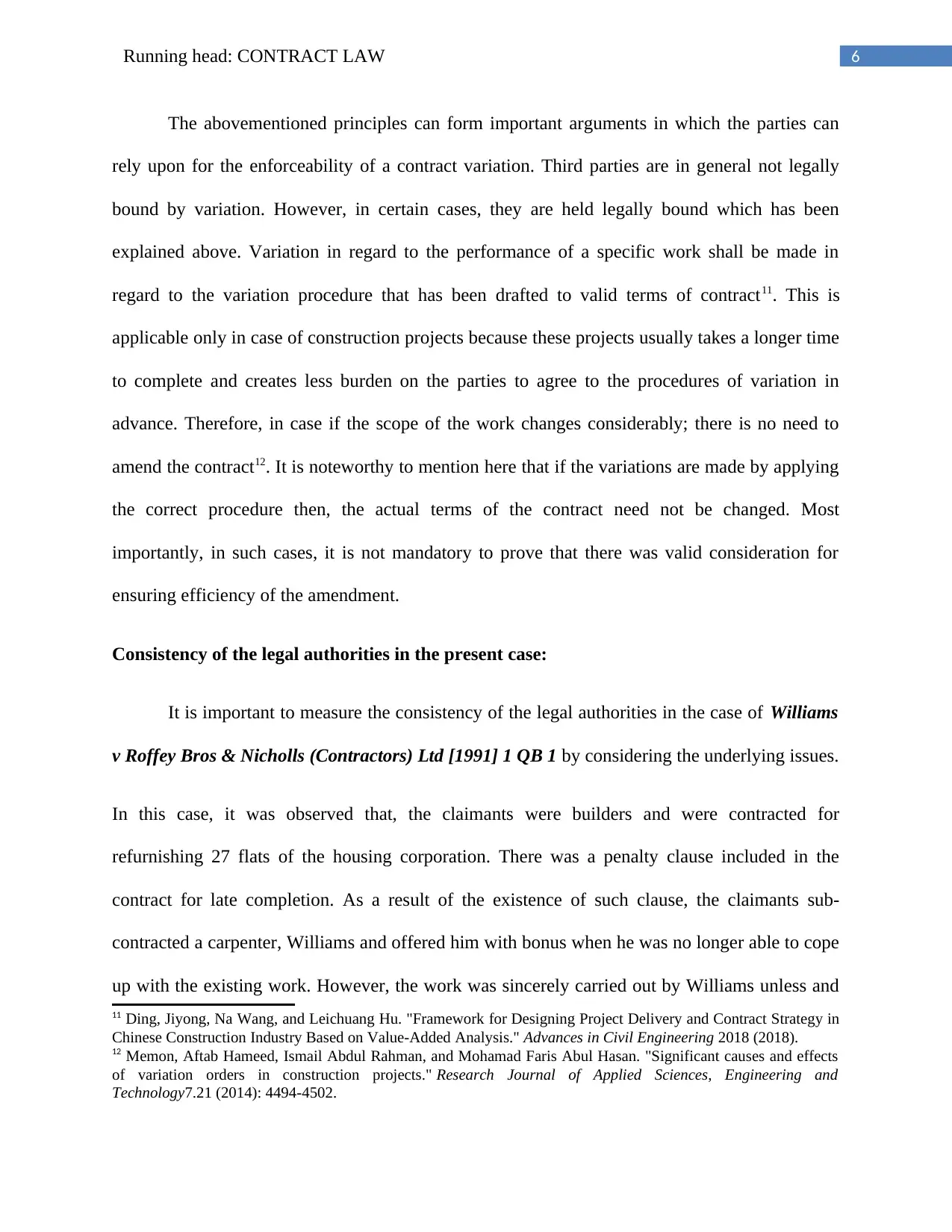
6Running head: CONTRACT LAW
The abovementioned principles can form important arguments in which the parties can
rely upon for the enforceability of a contract variation. Third parties are in general not legally
bound by variation. However, in certain cases, they are held legally bound which has been
explained above. Variation in regard to the performance of a specific work shall be made in
regard to the variation procedure that has been drafted to valid terms of contract11. This is
applicable only in case of construction projects because these projects usually takes a longer time
to complete and creates less burden on the parties to agree to the procedures of variation in
advance. Therefore, in case if the scope of the work changes considerably; there is no need to
amend the contract12. It is noteworthy to mention here that if the variations are made by applying
the correct procedure then, the actual terms of the contract need not be changed. Most
importantly, in such cases, it is not mandatory to prove that there was valid consideration for
ensuring efficiency of the amendment.
Consistency of the legal authorities in the present case:
It is important to measure the consistency of the legal authorities in the case of Williams
v Roffey Bros & Nicholls (Contractors) Ltd [1991] 1 QB 1 by considering the underlying issues.
In this case, it was observed that, the claimants were builders and were contracted for
refurnishing 27 flats of the housing corporation. There was a penalty clause included in the
contract for late completion. As a result of the existence of such clause, the claimants sub-
contracted a carpenter, Williams and offered him with bonus when he was no longer able to cope
up with the existing work. However, the work was sincerely carried out by Williams unless and
11 Ding, Jiyong, Na Wang, and Leichuang Hu. "Framework for Designing Project Delivery and Contract Strategy in
Chinese Construction Industry Based on Value-Added Analysis." Advances in Civil Engineering 2018 (2018).
12 Memon, Aftab Hameed, Ismail Abdul Rahman, and Mohamad Faris Abul Hasan. "Significant causes and effects
of variation orders in construction projects." Research Journal of Applied Sciences, Engineering and
Technology7.21 (2014): 4494-4502.
The abovementioned principles can form important arguments in which the parties can
rely upon for the enforceability of a contract variation. Third parties are in general not legally
bound by variation. However, in certain cases, they are held legally bound which has been
explained above. Variation in regard to the performance of a specific work shall be made in
regard to the variation procedure that has been drafted to valid terms of contract11. This is
applicable only in case of construction projects because these projects usually takes a longer time
to complete and creates less burden on the parties to agree to the procedures of variation in
advance. Therefore, in case if the scope of the work changes considerably; there is no need to
amend the contract12. It is noteworthy to mention here that if the variations are made by applying
the correct procedure then, the actual terms of the contract need not be changed. Most
importantly, in such cases, it is not mandatory to prove that there was valid consideration for
ensuring efficiency of the amendment.
Consistency of the legal authorities in the present case:
It is important to measure the consistency of the legal authorities in the case of Williams
v Roffey Bros & Nicholls (Contractors) Ltd [1991] 1 QB 1 by considering the underlying issues.
In this case, it was observed that, the claimants were builders and were contracted for
refurnishing 27 flats of the housing corporation. There was a penalty clause included in the
contract for late completion. As a result of the existence of such clause, the claimants sub-
contracted a carpenter, Williams and offered him with bonus when he was no longer able to cope
up with the existing work. However, the work was sincerely carried out by Williams unless and
11 Ding, Jiyong, Na Wang, and Leichuang Hu. "Framework for Designing Project Delivery and Contract Strategy in
Chinese Construction Industry Based on Value-Added Analysis." Advances in Civil Engineering 2018 (2018).
12 Memon, Aftab Hameed, Ismail Abdul Rahman, and Mohamad Faris Abul Hasan. "Significant causes and effects
of variation orders in construction projects." Research Journal of Applied Sciences, Engineering and
Technology7.21 (2014): 4494-4502.
Paraphrase This Document
Need a fresh take? Get an instant paraphrase of this document with our AI Paraphraser
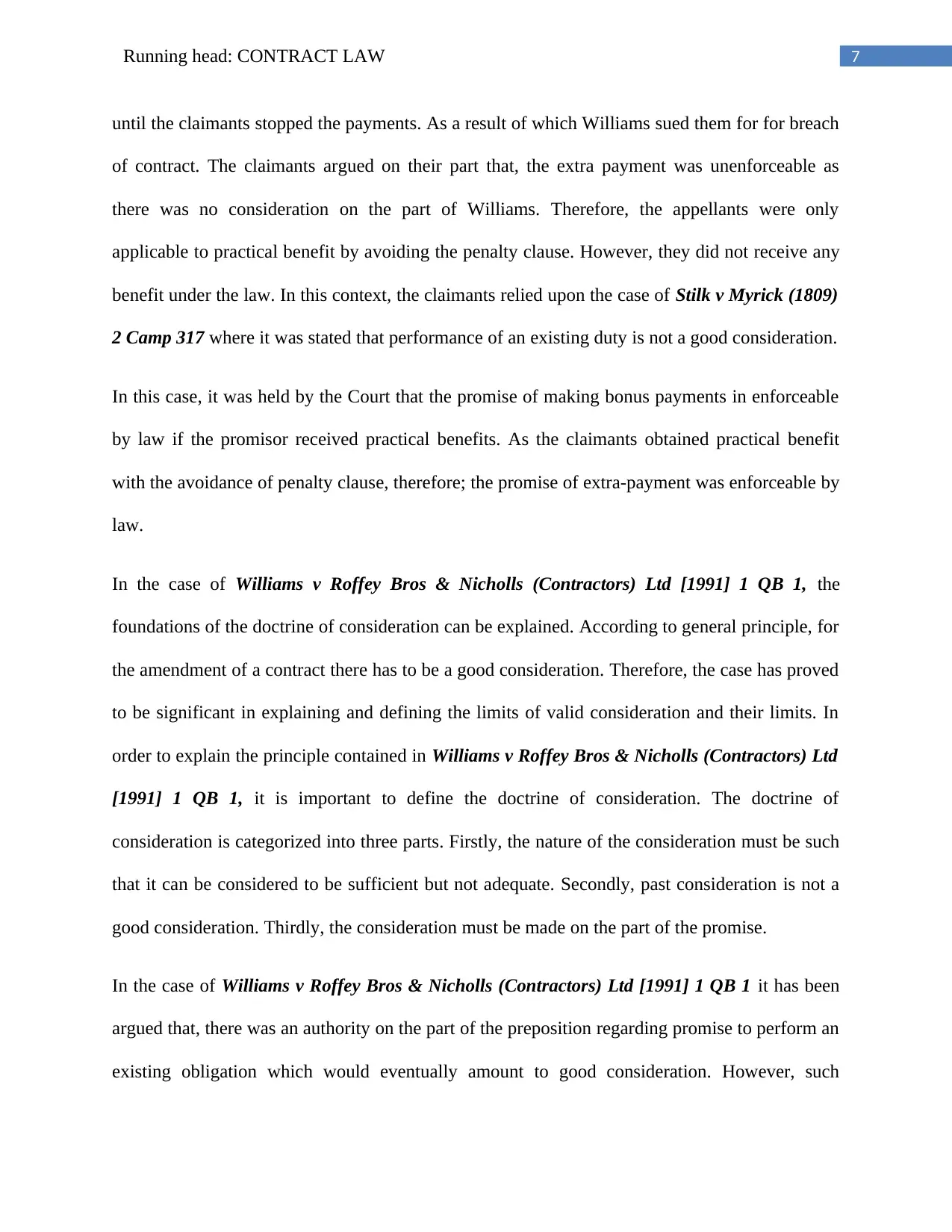
7Running head: CONTRACT LAW
until the claimants stopped the payments. As a result of which Williams sued them for for breach
of contract. The claimants argued on their part that, the extra payment was unenforceable as
there was no consideration on the part of Williams. Therefore, the appellants were only
applicable to practical benefit by avoiding the penalty clause. However, they did not receive any
benefit under the law. In this context, the claimants relied upon the case of Stilk v Myrick (1809)
2 Camp 317 where it was stated that performance of an existing duty is not a good consideration.
In this case, it was held by the Court that the promise of making bonus payments in enforceable
by law if the promisor received practical benefits. As the claimants obtained practical benefit
with the avoidance of penalty clause, therefore; the promise of extra-payment was enforceable by
law.
In the case of Williams v Roffey Bros & Nicholls (Contractors) Ltd [1991] 1 QB 1, the
foundations of the doctrine of consideration can be explained. According to general principle, for
the amendment of a contract there has to be a good consideration. Therefore, the case has proved
to be significant in explaining and defining the limits of valid consideration and their limits. In
order to explain the principle contained in Williams v Roffey Bros & Nicholls (Contractors) Ltd
[1991] 1 QB 1, it is important to define the doctrine of consideration. The doctrine of
consideration is categorized into three parts. Firstly, the nature of the consideration must be such
that it can be considered to be sufficient but not adequate. Secondly, past consideration is not a
good consideration. Thirdly, the consideration must be made on the part of the promise.
In the case of Williams v Roffey Bros & Nicholls (Contractors) Ltd [1991] 1 QB 1 it has been
argued that, there was an authority on the part of the preposition regarding promise to perform an
existing obligation which would eventually amount to good consideration. However, such
until the claimants stopped the payments. As a result of which Williams sued them for for breach
of contract. The claimants argued on their part that, the extra payment was unenforceable as
there was no consideration on the part of Williams. Therefore, the appellants were only
applicable to practical benefit by avoiding the penalty clause. However, they did not receive any
benefit under the law. In this context, the claimants relied upon the case of Stilk v Myrick (1809)
2 Camp 317 where it was stated that performance of an existing duty is not a good consideration.
In this case, it was held by the Court that the promise of making bonus payments in enforceable
by law if the promisor received practical benefits. As the claimants obtained practical benefit
with the avoidance of penalty clause, therefore; the promise of extra-payment was enforceable by
law.
In the case of Williams v Roffey Bros & Nicholls (Contractors) Ltd [1991] 1 QB 1, the
foundations of the doctrine of consideration can be explained. According to general principle, for
the amendment of a contract there has to be a good consideration. Therefore, the case has proved
to be significant in explaining and defining the limits of valid consideration and their limits. In
order to explain the principle contained in Williams v Roffey Bros & Nicholls (Contractors) Ltd
[1991] 1 QB 1, it is important to define the doctrine of consideration. The doctrine of
consideration is categorized into three parts. Firstly, the nature of the consideration must be such
that it can be considered to be sufficient but not adequate. Secondly, past consideration is not a
good consideration. Thirdly, the consideration must be made on the part of the promise.
In the case of Williams v Roffey Bros & Nicholls (Contractors) Ltd [1991] 1 QB 1 it has been
argued that, there was an authority on the part of the preposition regarding promise to perform an
existing obligation which would eventually amount to good consideration. However, such
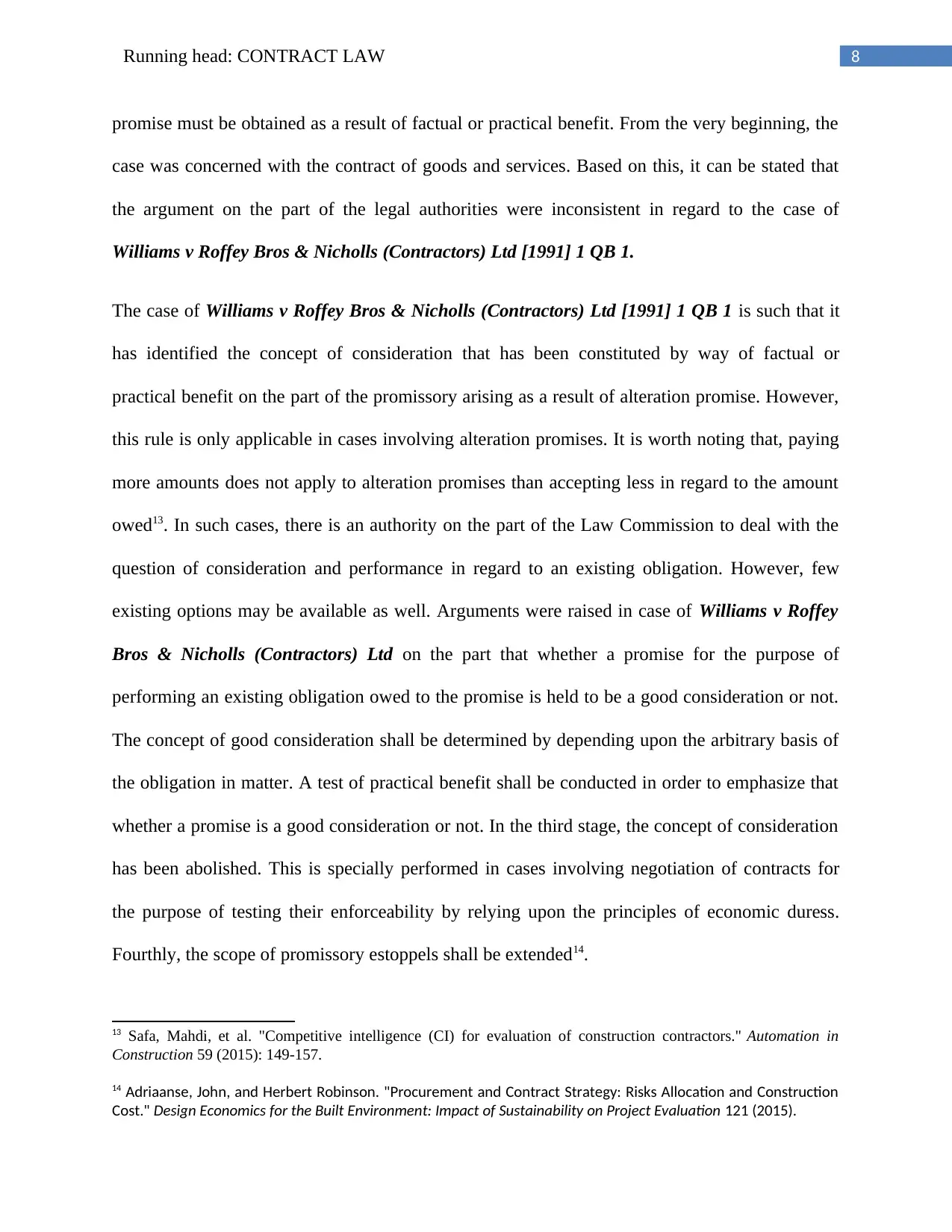
8Running head: CONTRACT LAW
promise must be obtained as a result of factual or practical benefit. From the very beginning, the
case was concerned with the contract of goods and services. Based on this, it can be stated that
the argument on the part of the legal authorities were inconsistent in regard to the case of
Williams v Roffey Bros & Nicholls (Contractors) Ltd [1991] 1 QB 1.
The case of Williams v Roffey Bros & Nicholls (Contractors) Ltd [1991] 1 QB 1 is such that it
has identified the concept of consideration that has been constituted by way of factual or
practical benefit on the part of the promissory arising as a result of alteration promise. However,
this rule is only applicable in cases involving alteration promises. It is worth noting that, paying
more amounts does not apply to alteration promises than accepting less in regard to the amount
owed13. In such cases, there is an authority on the part of the Law Commission to deal with the
question of consideration and performance in regard to an existing obligation. However, few
existing options may be available as well. Arguments were raised in case of Williams v Roffey
Bros & Nicholls (Contractors) Ltd on the part that whether a promise for the purpose of
performing an existing obligation owed to the promise is held to be a good consideration or not.
The concept of good consideration shall be determined by depending upon the arbitrary basis of
the obligation in matter. A test of practical benefit shall be conducted in order to emphasize that
whether a promise is a good consideration or not. In the third stage, the concept of consideration
has been abolished. This is specially performed in cases involving negotiation of contracts for
the purpose of testing their enforceability by relying upon the principles of economic duress.
Fourthly, the scope of promissory estoppels shall be extended14.
13 Safa, Mahdi, et al. "Competitive intelligence (CI) for evaluation of construction contractors." Automation in
Construction 59 (2015): 149-157.
14 Adriaanse, John, and Herbert Robinson. "Procurement and Contract Strategy: Risks Allocation and Construction
Cost." Design Economics for the Built Environment: Impact of Sustainability on Project Evaluation 121 (2015).
promise must be obtained as a result of factual or practical benefit. From the very beginning, the
case was concerned with the contract of goods and services. Based on this, it can be stated that
the argument on the part of the legal authorities were inconsistent in regard to the case of
Williams v Roffey Bros & Nicholls (Contractors) Ltd [1991] 1 QB 1.
The case of Williams v Roffey Bros & Nicholls (Contractors) Ltd [1991] 1 QB 1 is such that it
has identified the concept of consideration that has been constituted by way of factual or
practical benefit on the part of the promissory arising as a result of alteration promise. However,
this rule is only applicable in cases involving alteration promises. It is worth noting that, paying
more amounts does not apply to alteration promises than accepting less in regard to the amount
owed13. In such cases, there is an authority on the part of the Law Commission to deal with the
question of consideration and performance in regard to an existing obligation. However, few
existing options may be available as well. Arguments were raised in case of Williams v Roffey
Bros & Nicholls (Contractors) Ltd on the part that whether a promise for the purpose of
performing an existing obligation owed to the promise is held to be a good consideration or not.
The concept of good consideration shall be determined by depending upon the arbitrary basis of
the obligation in matter. A test of practical benefit shall be conducted in order to emphasize that
whether a promise is a good consideration or not. In the third stage, the concept of consideration
has been abolished. This is specially performed in cases involving negotiation of contracts for
the purpose of testing their enforceability by relying upon the principles of economic duress.
Fourthly, the scope of promissory estoppels shall be extended14.
13 Safa, Mahdi, et al. "Competitive intelligence (CI) for evaluation of construction contractors." Automation in
Construction 59 (2015): 149-157.
14 Adriaanse, John, and Herbert Robinson. "Procurement and Contract Strategy: Risks Allocation and Construction
Cost." Design Economics for the Built Environment: Impact of Sustainability on Project Evaluation 121 (2015).
⊘ This is a preview!⊘
Do you want full access?
Subscribe today to unlock all pages.

Trusted by 1+ million students worldwide
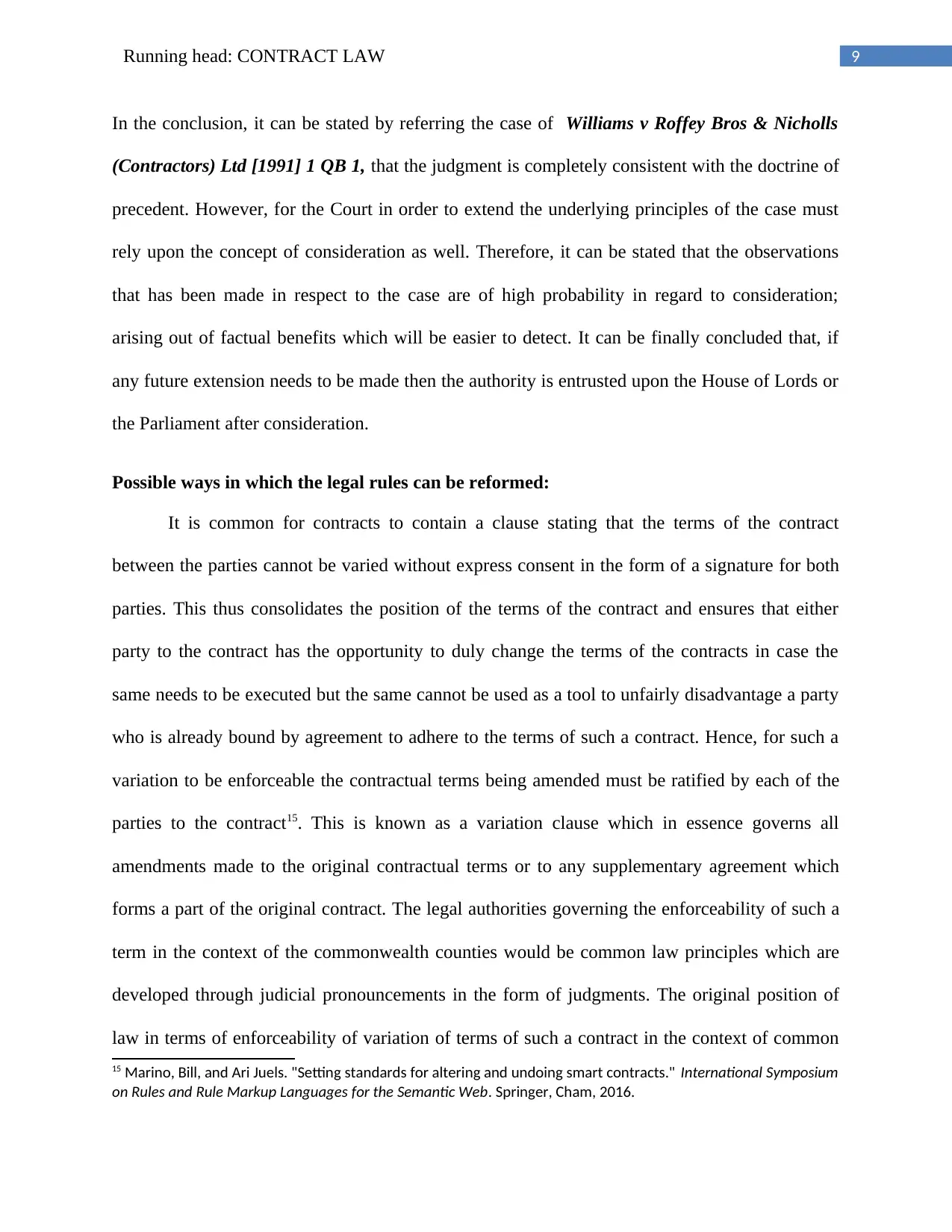
9Running head: CONTRACT LAW
In the conclusion, it can be stated by referring the case of Williams v Roffey Bros & Nicholls
(Contractors) Ltd [1991] 1 QB 1, that the judgment is completely consistent with the doctrine of
precedent. However, for the Court in order to extend the underlying principles of the case must
rely upon the concept of consideration as well. Therefore, it can be stated that the observations
that has been made in respect to the case are of high probability in regard to consideration;
arising out of factual benefits which will be easier to detect. It can be finally concluded that, if
any future extension needs to be made then the authority is entrusted upon the House of Lords or
the Parliament after consideration.
Possible ways in which the legal rules can be reformed:
It is common for contracts to contain a clause stating that the terms of the contract
between the parties cannot be varied without express consent in the form of a signature for both
parties. This thus consolidates the position of the terms of the contract and ensures that either
party to the contract has the opportunity to duly change the terms of the contracts in case the
same needs to be executed but the same cannot be used as a tool to unfairly disadvantage a party
who is already bound by agreement to adhere to the terms of such a contract. Hence, for such a
variation to be enforceable the contractual terms being amended must be ratified by each of the
parties to the contract15. This is known as a variation clause which in essence governs all
amendments made to the original contractual terms or to any supplementary agreement which
forms a part of the original contract. The legal authorities governing the enforceability of such a
term in the context of the commonwealth counties would be common law principles which are
developed through judicial pronouncements in the form of judgments. The original position of
law in terms of enforceability of variation of terms of such a contract in the context of common
15 Marino, Bill, and Ari Juels. "Setting standards for altering and undoing smart contracts." International Symposium
on Rules and Rule Markup Languages for the Semantic Web. Springer, Cham, 2016.
In the conclusion, it can be stated by referring the case of Williams v Roffey Bros & Nicholls
(Contractors) Ltd [1991] 1 QB 1, that the judgment is completely consistent with the doctrine of
precedent. However, for the Court in order to extend the underlying principles of the case must
rely upon the concept of consideration as well. Therefore, it can be stated that the observations
that has been made in respect to the case are of high probability in regard to consideration;
arising out of factual benefits which will be easier to detect. It can be finally concluded that, if
any future extension needs to be made then the authority is entrusted upon the House of Lords or
the Parliament after consideration.
Possible ways in which the legal rules can be reformed:
It is common for contracts to contain a clause stating that the terms of the contract
between the parties cannot be varied without express consent in the form of a signature for both
parties. This thus consolidates the position of the terms of the contract and ensures that either
party to the contract has the opportunity to duly change the terms of the contracts in case the
same needs to be executed but the same cannot be used as a tool to unfairly disadvantage a party
who is already bound by agreement to adhere to the terms of such a contract. Hence, for such a
variation to be enforceable the contractual terms being amended must be ratified by each of the
parties to the contract15. This is known as a variation clause which in essence governs all
amendments made to the original contractual terms or to any supplementary agreement which
forms a part of the original contract. The legal authorities governing the enforceability of such a
term in the context of the commonwealth counties would be common law principles which are
developed through judicial pronouncements in the form of judgments. The original position of
law in terms of enforceability of variation of terms of such a contract in the context of common
15 Marino, Bill, and Ari Juels. "Setting standards for altering and undoing smart contracts." International Symposium
on Rules and Rule Markup Languages for the Semantic Web. Springer, Cham, 2016.
Paraphrase This Document
Need a fresh take? Get an instant paraphrase of this document with our AI Paraphraser
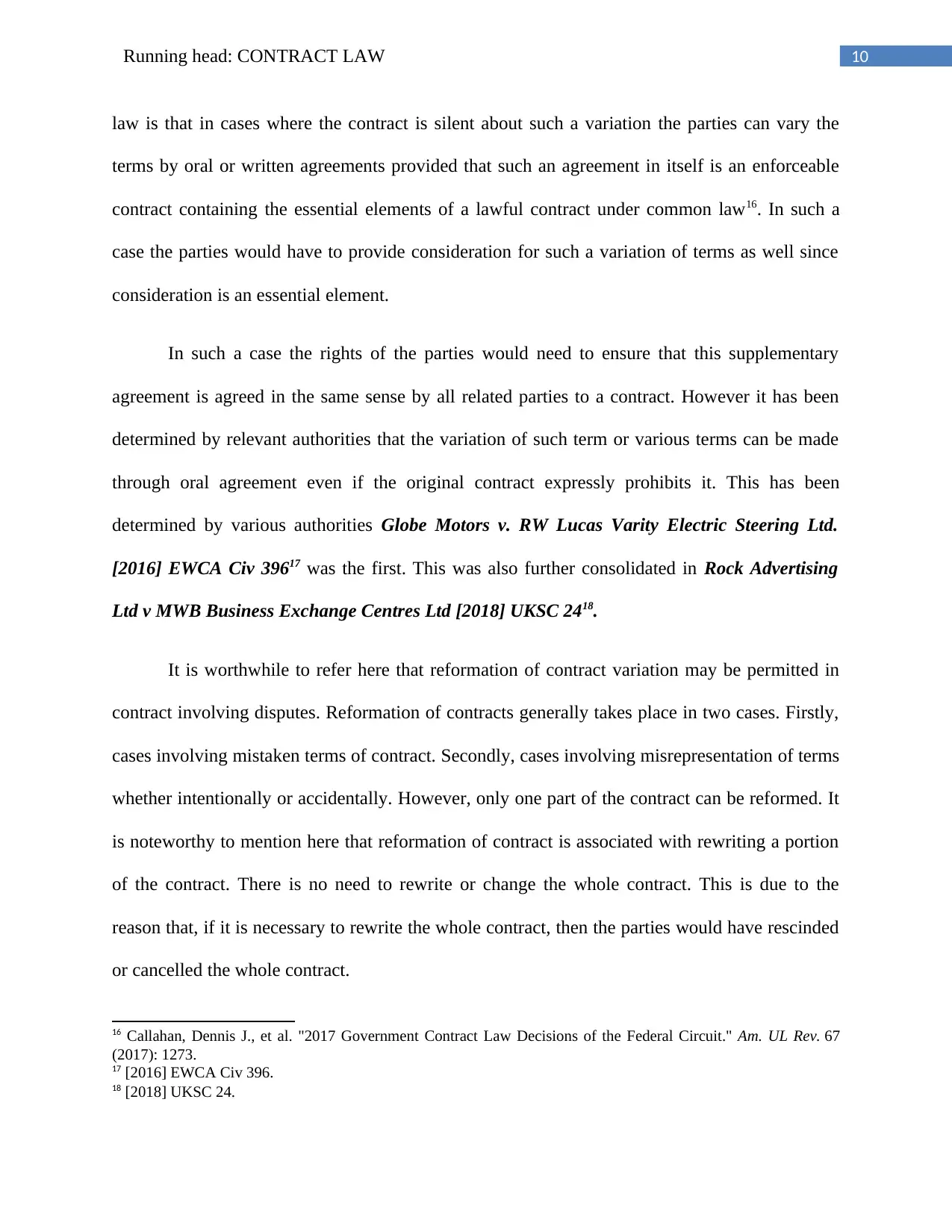
10Running head: CONTRACT LAW
law is that in cases where the contract is silent about such a variation the parties can vary the
terms by oral or written agreements provided that such an agreement in itself is an enforceable
contract containing the essential elements of a lawful contract under common law16. In such a
case the parties would have to provide consideration for such a variation of terms as well since
consideration is an essential element.
In such a case the rights of the parties would need to ensure that this supplementary
agreement is agreed in the same sense by all related parties to a contract. However it has been
determined by relevant authorities that the variation of such term or various terms can be made
through oral agreement even if the original contract expressly prohibits it. This has been
determined by various authorities Globe Motors v. RW Lucas Varity Electric Steering Ltd.
[2016] EWCA Civ 39617 was the first. This was also further consolidated in Rock Advertising
Ltd v MWB Business Exchange Centres Ltd [2018] UKSC 2418.
It is worthwhile to refer here that reformation of contract variation may be permitted in
contract involving disputes. Reformation of contracts generally takes place in two cases. Firstly,
cases involving mistaken terms of contract. Secondly, cases involving misrepresentation of terms
whether intentionally or accidentally. However, only one part of the contract can be reformed. It
is noteworthy to mention here that reformation of contract is associated with rewriting a portion
of the contract. There is no need to rewrite or change the whole contract. This is due to the
reason that, if it is necessary to rewrite the whole contract, then the parties would have rescinded
or cancelled the whole contract.
16 Callahan, Dennis J., et al. "2017 Government Contract Law Decisions of the Federal Circuit." Am. UL Rev. 67
(2017): 1273.
17 [2016] EWCA Civ 396.
18 [2018] UKSC 24.
law is that in cases where the contract is silent about such a variation the parties can vary the
terms by oral or written agreements provided that such an agreement in itself is an enforceable
contract containing the essential elements of a lawful contract under common law16. In such a
case the parties would have to provide consideration for such a variation of terms as well since
consideration is an essential element.
In such a case the rights of the parties would need to ensure that this supplementary
agreement is agreed in the same sense by all related parties to a contract. However it has been
determined by relevant authorities that the variation of such term or various terms can be made
through oral agreement even if the original contract expressly prohibits it. This has been
determined by various authorities Globe Motors v. RW Lucas Varity Electric Steering Ltd.
[2016] EWCA Civ 39617 was the first. This was also further consolidated in Rock Advertising
Ltd v MWB Business Exchange Centres Ltd [2018] UKSC 2418.
It is worthwhile to refer here that reformation of contract variation may be permitted in
contract involving disputes. Reformation of contracts generally takes place in two cases. Firstly,
cases involving mistaken terms of contract. Secondly, cases involving misrepresentation of terms
whether intentionally or accidentally. However, only one part of the contract can be reformed. It
is noteworthy to mention here that reformation of contract is associated with rewriting a portion
of the contract. There is no need to rewrite or change the whole contract. This is due to the
reason that, if it is necessary to rewrite the whole contract, then the parties would have rescinded
or cancelled the whole contract.
16 Callahan, Dennis J., et al. "2017 Government Contract Law Decisions of the Federal Circuit." Am. UL Rev. 67
(2017): 1273.
17 [2016] EWCA Civ 396.
18 [2018] UKSC 24.
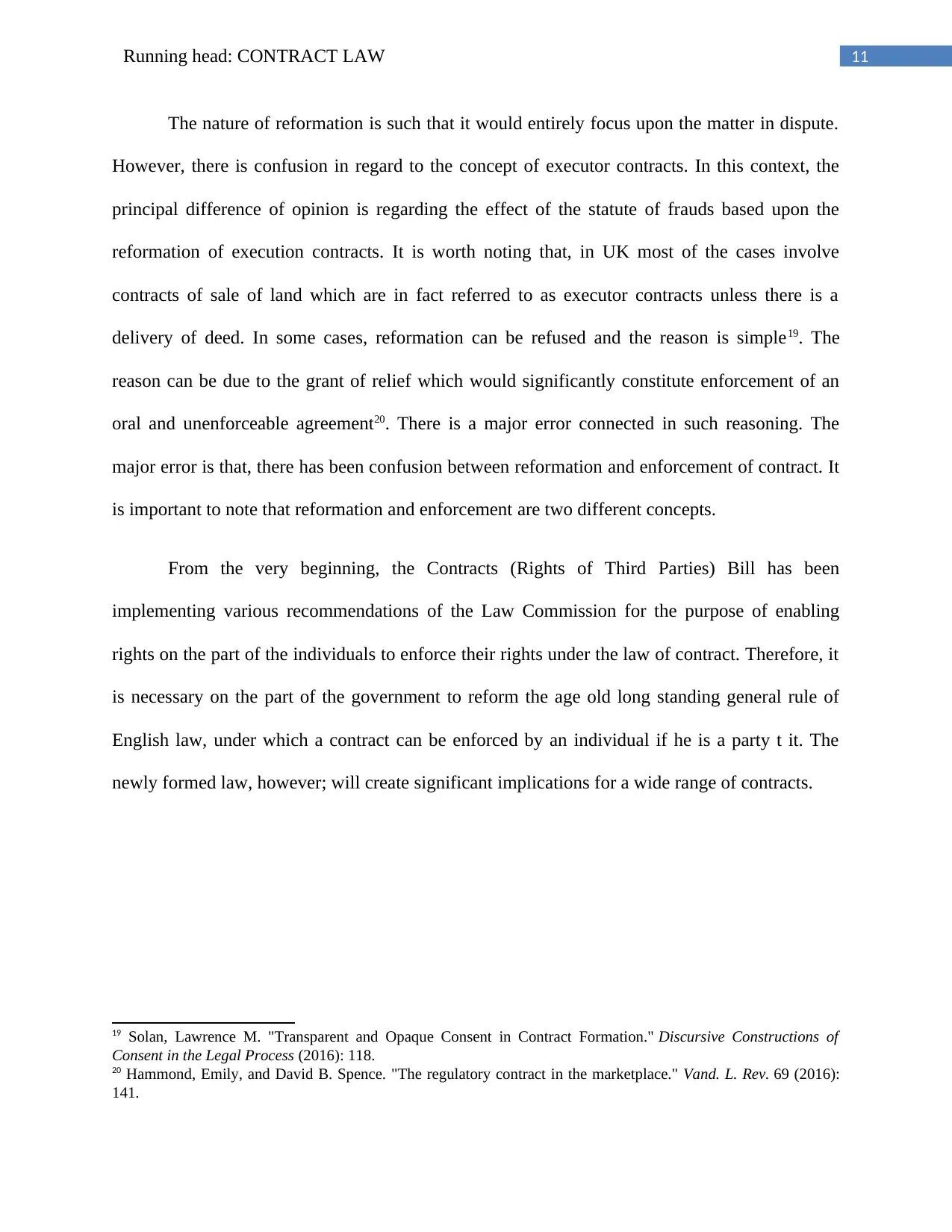
11Running head: CONTRACT LAW
The nature of reformation is such that it would entirely focus upon the matter in dispute.
However, there is confusion in regard to the concept of executor contracts. In this context, the
principal difference of opinion is regarding the effect of the statute of frauds based upon the
reformation of execution contracts. It is worth noting that, in UK most of the cases involve
contracts of sale of land which are in fact referred to as executor contracts unless there is a
delivery of deed. In some cases, reformation can be refused and the reason is simple19. The
reason can be due to the grant of relief which would significantly constitute enforcement of an
oral and unenforceable agreement20. There is a major error connected in such reasoning. The
major error is that, there has been confusion between reformation and enforcement of contract. It
is important to note that reformation and enforcement are two different concepts.
From the very beginning, the Contracts (Rights of Third Parties) Bill has been
implementing various recommendations of the Law Commission for the purpose of enabling
rights on the part of the individuals to enforce their rights under the law of contract. Therefore, it
is necessary on the part of the government to reform the age old long standing general rule of
English law, under which a contract can be enforced by an individual if he is a party t it. The
newly formed law, however; will create significant implications for a wide range of contracts.
19 Solan, Lawrence M. "Transparent and Opaque Consent in Contract Formation." Discursive Constructions of
Consent in the Legal Process (2016): 118.
20 Hammond, Emily, and David B. Spence. "The regulatory contract in the marketplace." Vand. L. Rev. 69 (2016):
141.
The nature of reformation is such that it would entirely focus upon the matter in dispute.
However, there is confusion in regard to the concept of executor contracts. In this context, the
principal difference of opinion is regarding the effect of the statute of frauds based upon the
reformation of execution contracts. It is worth noting that, in UK most of the cases involve
contracts of sale of land which are in fact referred to as executor contracts unless there is a
delivery of deed. In some cases, reformation can be refused and the reason is simple19. The
reason can be due to the grant of relief which would significantly constitute enforcement of an
oral and unenforceable agreement20. There is a major error connected in such reasoning. The
major error is that, there has been confusion between reformation and enforcement of contract. It
is important to note that reformation and enforcement are two different concepts.
From the very beginning, the Contracts (Rights of Third Parties) Bill has been
implementing various recommendations of the Law Commission for the purpose of enabling
rights on the part of the individuals to enforce their rights under the law of contract. Therefore, it
is necessary on the part of the government to reform the age old long standing general rule of
English law, under which a contract can be enforced by an individual if he is a party t it. The
newly formed law, however; will create significant implications for a wide range of contracts.
19 Solan, Lawrence M. "Transparent and Opaque Consent in Contract Formation." Discursive Constructions of
Consent in the Legal Process (2016): 118.
20 Hammond, Emily, and David B. Spence. "The regulatory contract in the marketplace." Vand. L. Rev. 69 (2016):
141.
⊘ This is a preview!⊘
Do you want full access?
Subscribe today to unlock all pages.

Trusted by 1+ million students worldwide
1 out of 14
Related Documents
Your All-in-One AI-Powered Toolkit for Academic Success.
+13062052269
info@desklib.com
Available 24*7 on WhatsApp / Email
![[object Object]](/_next/static/media/star-bottom.7253800d.svg)
Unlock your academic potential
Copyright © 2020–2026 A2Z Services. All Rights Reserved. Developed and managed by ZUCOL.





